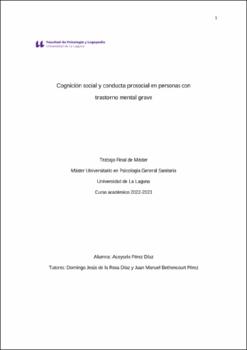Cognición social y conducta prosocial en personas con trastorno mental grave
Autor
Pérez Díaz, AceyseleFecha
2023Resumen
El objetivo de este estudio es conocer el efecto que tiene una intervención terapéutica
relacionada con la Cognición Social (CS) en un grupo de personas que presentan Trastorno
Mental Grave (TMG) y si dicha intervención tiene un efecto en la Conducta Prosocial (CP)
de éstos. En esta investigación participaron 19 personas usuarias del Centro de Rehabilitación
Psicosocial (CRPS) El Mojón, en el municipio tinerfeño de Arona. Fueron evaluados antes y
después de la aplicación de un programa mediante tres instrumentos: La Escala de Cognición
Social (ECS), Test de Insinuaciones (TI) y Escala para la Medición de la Conducta Prosocial
en Adultos (ECP). Se administró el Programa de Entrenamiento de Cognición Social (PECS)
a modo de intervención. Se encontraron diferencias significativas en tres de los cuatro
factores de CS entre la fase pre y post de nuestro programa a favor de la fase post. Sin
embargo, no se produjeron cambios en la CP de los participantes. The objective of this study is to find out the effect of a therapeutic intervention related
to social cognition in a group of people who present Severe Mental Disorder and whether the
intervention in social cognition has an effect on the prosocial behavior of these. Nineteen
users of the El Mojón Psychosocial Rehabilitation Center from Arona (Tenerife) participated
in this research. They were evaluated before and after the application of a program using
three instruments: The Social Cognition Scale, Hinting Task Test and the Scale for the
Measurement of Prosocial Behavior in Adults. The Social Cognition Training Program was
administered as an intervention. Significant differences were found in three of the four social
cognition factors between the pre and post phase of our program in favor of the post phase.
However, there were no changes in the prosocial behavior of the participants.





